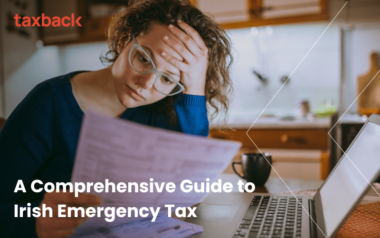OK picture the scene.
The new summer blockbuster is out and your partner really wants to see it. You do too.
So you head along to the cinema, stand in line and order your tickets and treats.
‘That’ll be €30, please!’
You whip out your wallet, fork over €40 and say ‘Keep the change!’
Does this exchange sound like something you would do?
No? Didn’t think so!
And yet so many of us overspend on our tax bills all the time.
In fact, millions of euros worth of tax refunds go unclaimed every year.
Sure, when it comes to tax relief most people are aware of the big hitters (think doctor bills, flat rate expenses etc.). But the truth is that there are many more reasons why you could be due tax back.
And when you consider that the average PAYE tax refund from Taxback is €1,880, it’s easy to see why claiming what you’re owed is so worthwhile.
In this blog, we’ll cover some of the lesser-known reliefs available to Irish taxpayers and how you can go about claiming them.
1. Medical and dental expenses
OK, so you’re probably already aware that you’re entitled to claim tax back on your GP bills and prescriptions.
But did you know that there are a whole range of other medical expenses that qualify for tax relief?
It’s true! Just check out the list below.
What medical or dental reliefs can I claim?
You will be entitled to tax back if you paid for health expenses on behalf of yourself, a loved one or another individual.
Examples of qualifying health expenses include:
- doctor’s and consultant’s services
- routine and maternity care for women during pregnancy
- diagnostic procedures recommended by a practitioner
- services in hospitals or treatment facilities such as clinics, where the services are either:
– provided by a practitioner
or
– diagnostic procedures recommended by a practitioner
- transport by ambulance
- in-vitro fertilization (IVF)
- acupuncture (where provided by a practitioner)
- non-routine dental care
- treatment from a psychologist or psychotherapist where either:
– the psychologist or psychotherapist is a practitioner
or
– you are referred for a diagnostic procedure by a psychiatrist
- additional expenses of health care for a child:
– suffering from a life-threatening illness or permanent disability
or
– who needs speech and language therapy or educational psychological assessment
- additional expenses for a kidney patient
- nursing home and additional nursing care expenses
You can also claim relief on the following if prescribed by a practitioner:
- Drugs and medicines
- Orthoptic or similar treatment (treatment for squints and eye movement disorders)
- Physiotherapy or similar treatment (such as an osteopath or bone setter)
- Podiatry or chiropody costs
- Special diet expenses for coeliacs and diabetics
- Cost of purchasing, maintaining and repairing medical, surgical, dental or nursing appliances
Finally, you can also claim for relief if you have incurred expenses for non-routine dental treatment such as:
- crowns
- veneers or Rembrandt-type etched fillings
- tip replacing
- gold posts or fibreglass posts
- inlays (a smaller version of a gold crown), if made outside the mouth
- endodontics (root canal treatment)
- periodontal treatment for gum disease such as:
– root planing (including curettage and debridement) and gum flaps
– chrome cobalt splints (but not if they contain teeth)
– implants (including bone grafting and bone augmentation)
- orthodontic treatment: provision of braces and related treatments
- surgical extraction of impacted wisdom teeth
- bridgework (an enamel-retained bridge or a tooth-supported bridge)
Note – you can’t claim relief on:
- Routine dental care, including:
– Fillings
– scaling or cleaning
– tooth extraction
– providing or repairing artificial teeth or dentures
- Routine ophthalmic (eye) care, such as eye tests
- Cosmetic surgery or procedures, such as rhinoplasty, breast augmentation or botox treatment. (Relief may be available where the surgery corrects a health issue, such as breathing difficulties)
- Guide and assistance dog costs (instead you can claim the Guide Dog Allowance or Assistance Dog Allowance)
How much tax back can I claim for medical expenses?
You can generally claim tax relief for health expenses at your standard rate of tax (20%).
Expenses relating to Nursing Homes are an exception as you can claim tax back on these costs at 40%.
Anything else I should know about claiming health expenses?
You can’t claim relief on any portion of the expense which is covered by:
- insurance
- a public or local authority, for example, the HSE
- any other source, such as a compensation payment
2. Working from home
Do you occasionally work from home?
You’re not alone! In fact, roughly 100,000 people in Ireland work ‘mainly at or from home’.
And many of these workers are completely unaware that they can claim tax relief on expenses incurred while working from home.
Аm I entitled to a working-from-home tax credit?
People who work from home on either a full or part-time basis are eligible for this relief. Eligibility also applies if you work part-time at home and the remainder in your normal place of work.
The purpose of this credit is to cover expenses (heating, electricity and broadband for example) incurred by individuals who work from home.
How much tax back can I claim if I work from home?
Employers can pay €3.20 tax-free per day to their employees to cover the additional costs associated with working from home. However, employers are not legally obliged to do this. If you work from home and your employer doesn’t provide this payment to you, you can claim tax back instead.
What’s more, if your employer does reimburse you and the cost of your expenses exceeds €3.20 per day, tax can still be reclaimed on the difference.
Anything else I should know about working from home tax relief?
You can only claim for the proportion of costs that relate to your time working from home.
In 2018, Fiona had heating expenses of €1,500, broadband expenses of €500, and electricity costs of €1,200. Fiona worked out that the proportion of those costs that could be attributed to her days working from home was €450, meaning she can claim it against the higher rate of tax.
Get Your Irish Tax Refund Now!
3. Renting property
Were you renting a flat, house or apartment on 7 December 2010?
If so, you may be able to claim a Rent Tax Credit.
Up to 31 December 2017, you could claim a tax credit if you paid for private rented accommodation. This included rent paid for flats, apartments or houses. It did not include rent paid to local authorities or the army.

I rent an apartment, am I entitled to a tax credit?
You can only claim this credit if:
- you were renting a flat, house or apartment in Ireland on 7 December 2010
- the property you rented was your main residence
To claim this credit, you must be able to provide evidence that you were renting should Revenue request it.
Like most types of tax expenses, it’s always a good idea to keep your receipts in a safe place (generally for 6 years).
How much tax back can I claim for renting?
Rent Tax Credit rates
| Your circumstances | Max credit for 2015 tax year | Max credit for the 2016 tax year | Max credit for the 2017 tax year |
| Single and aged under 55 years | €120 | €80 | €40 |
| Single and aged over 55 years | €240 | €160 | €80 |
| Married/widowed/in a civil partnership/surviving civil partner and aged under 55 years | €240 | €160 | €80 |
| Married/widowed/in a civil partnership/surviving civil partner and aged over 55 years | €480 | €320 | €160 |
Anything else I should know about tax relief for renters?
While this credit was discontinued at the end of 2017, you can go back four years to claim your tax entitlements. So if you are eligible you will be entitled to claim this credit for the 2015 tax year, 2016 tax year & 2017 tax year.
4. Tuition fees
Do you pay college fees for yourself or a loved one?
Third-level fee payers can potentially claim tax relief on tuition fees (including the student contribution) that are paid for eligible education courses.
Am I entitled to claim tax relief for my tuition fees?
The most common type of application for this relief is from parents with more than one child in college. This is because there is no limit on the number of individuals for whom you can claim.
However, relief can also be claimed by students or parents or anyone who is paying fees on behalf of a college goer.
How much tax back can I claim for my college fees?
There are three things you need to know:
- Tax relief is granted at the standard rate – 20%
- There is a limit of fees, at €7,000 per course, on which you can claim relief
- And there is no tax relief on the first €3,000 spent on tuition fees for full-time courses or €1,500 for part-time courses – these are known as ‘disregard amounts’
The disregard amount is subtracted from your qualifying fees when you are calculating your tax relief. One disregard amount is applied to each claim for every tax year.
Let’s say you’re paying tuition fees of €4,500 and a student contribution of €3,500. Qualifying fees for tax relief are capped at €7,000. So, when the disregard amount is taken away, this leaves a total of €4,000. You will be entitled to tax relief at 20% of this amount – which is €800.
Anything else I should know about tax relief for college fee payers?
It’s important to note that, if you are paying fees for more than one course or student, you only have to subtract the disregard amount once.
And keep in mind that there are some third-level fees on which tax relief can’t be claimed. For example, you can’t apply for relief on examination, registration, or administration fees.
Get Your Irish Tax Refund Now!
5. Home improvements
Getting some work done at home?
You may be entitled to benefit from the Home Renovation Incentive (HRI).
The HRI scheme enables homeowners, landlords and local authority tenants to claim tax relief on repairs, renovations or improvement work that is carried out on their main home or rental property.

Am I entitled to claim tax relief for my home improvement works?
To claim this relief you’ll first need to ensure that you are up-to-date with your tax affairs. In other words, you must be paying income tax (PAYE or self-assessment) to avail of the HRI credit. And if you are a homeowner or a landlord, you must be up to date with your Local Property Tax.
Next, it’s important to note that not all home improvement work will qualify for the credit.
Any repair, renovation or improvement work that is subject to VAT at 13.5% will qualify for the HRI.
This includes:
- extensions
- garages
- attic conversions
- the supply and fitting of kitchens, bathrooms and built-in wardrobes
- fitting of windows
- garden landscaping
- plumbing
- tiling
- rewiring
- insulating
- plastering
- painting
- and more
Keep in mind, however, that work which is subject to VAT at 23% (such as architect’s fees) is not covered under this scheme. Neither are items such as furniture, white goods or carpets. Also, if you buy materials yourself, (such as paint or tiles), you can’t include them in your claim for tax relief.
The timing of when the work is completed is also important.
To qualify for the HRI, the work must be done between:
- 25 October 2013 and 31 December 2018 for homeowners
- 15 October 2014 and 31 December 2018 for landlords
- 1 January 2017 and 31 December 2018 for local authority tenants
There is one exception to the above timeline. If you require planning permission to carry out the work, the permission must have been granted by 31 December 2018, and you will have until 31 March 2019 to complete and pay for the work.
How much tax relief can I claim for my home renovation?
The minimum credit you can claim is €595, based on the minimum qualifying expenditure of €4,405. The maximum is €4,050, based on the maximum qualifying expenditure of €30,000.
When is the HRI credit paid?
This credit is typically paid over two years following the year in which the work was carried out on your property and you paid for it.
If you’re a PAYE worker, your credit will be divided evenly across your pay dates over two years.
Meanwhile, if you’re a self-employed taxpayer, the credit will be split and included in your self-assessment over two years – half in each year.
Anything else I should know about HRI tax relief?
Any contractor you use must be participating in the HRI scheme. This means they are registered for Value Added Tax (VAT) in Ireland and are tax-compliant.
Get Your Irish Tax Refund Now!
How can I claim tax credits?
Keep in mind that you will need proof of costs incurred (relevant bills) to claim tax relief.
You can avail of your tax entitlements yourself by filing a tax return (the HRI credit can be claimed once the contractor has recorded the work with Revenue).
Alternatively, by getting in touch with the tax team at Taxback, you’ll be guaranteed to receive your maximum legal tax refund. Our experts will handle all of the boring tax paperwork and transfer your refund straight to your bank account.
Last Updated on March 4, 2019







